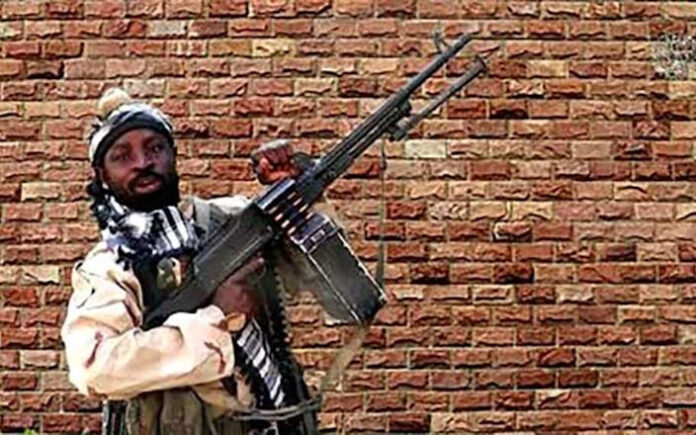
The notorious leader of Islamist terror group Boko Haram, Abubakar Shekau, has been seriously injured, with some reporting he is dead after trying to blow himself up, according to intelligence sources.
Shekau, the man behind the Chibok schoolgirl kidnapping in 2014, tried to kill himself to avoid capture when a rival group supported by the Islamic State surrounded him on Wednesday, sources told AFP.
In a confidential briefing leaked to Nigerian media and seen by The Daily Telegraph, the country’s intelligence services said: “Shekau detonated a bomb and killed himself when he observed that the ISWAP fighters wanted to capture him alive.”
But an intelligence source told AFP Shekau had managed to escape with some men after the attack.
In 2016, men from Boko Haram defected to create a splinter group, known as Islamic State West Africa Province (ISWAP).
While Shekau revelled in indiscriminate brutality, ISWAP refused to kill Muslim civilians in a ploy to more successfully recruit from local communities.
- Big cats seized from park belonging to Tiger King couple
- ‘Houses of horror’: Child sex abuse in Indonesia’s schools
Bulama Bukarti, a Boko Haram specialist at the Tony Blair Institute for Global Change, told The Telegraph that if confirmed, Shekau’s death would be “a huge milestone, a turning point in Boko Haram’s history.”
“If his death exacerbates the infighting, it means more killings on both sides and that would be positive news for counter terrorism. If his death leads to the reunification of Boko Haram, then it will become a unified force and they will continue to pursue civilian-friendly policy.”
The brutal leader has been reported dead several times in the past, but each time he has issued statements or videos to rebut the claims.
The cleric became the group’s leader in 2010 and launched a sadistic campaign of terror across the Lake Chad region into southern Niger, northern Cameroon and Chad. Hamstrung by low morale, a lack of resources and decades of corruption, the Nigerian military struggled to stop Boko Haram’s advance.
“Shekau defied the Nigerian armed forces for 12 years, if it’s true it speaks volumes about how alarmingly powerful ISWAP is,” Mr Bukarti added.
Despite frequent declarations of victory by the Nigerian government, Boko Haram and their breakaway group, ISWAP, have proved extraordinarily resilient. Reportedly, the jihadists have killed thousands of local soldiers over the last two years.
More than 40,000 people have been killed and over two million have fled their homes due to the conflict in northeast Nigeria. Fighting has spread to parts of neighbouring Chad, Cameroon and Niger.
SOURCE: YAHOO NEWS




